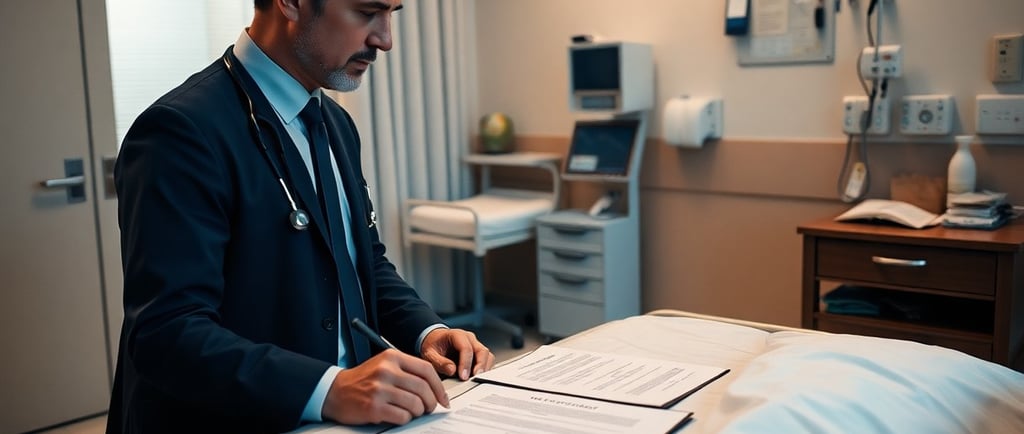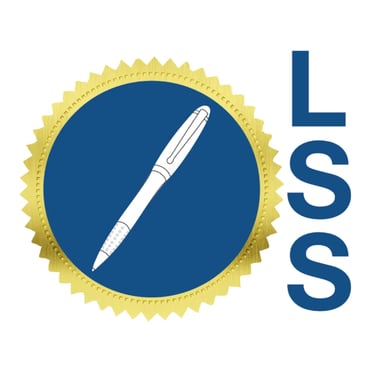Emergency Notarization for Hospice Patients
Discover the importance of emergency notarization for patients in hospice or critical care. Learn how to navigate the legal maze and ensure timely notarization for your loved ones in need.
HOSPITALS & NURSING HOMES
Frank L Coxx
6/9/20257 min read


There's a significant need for emergency notarization services when dealing with patients in hospice or critical care settings. Whether you are a family member, caregiver, or medical professional, understanding how to navigate the notarization process can help ensure that imperative documents are properly executed during these sensitive times. Your knowledge of available options and resources can greatly assist in facilitating necessary legal arrangements and healthcare decisions, allowing you to focus on providing comfort and support to your loved ones in their time of need.
Navigating the Legal Maze: Why Emergency Notarization Matters
Emergency notarization plays a pivotal role in ensuring that urgent legal matters are addressed swiftly, particularly for patients in hospice or critical care. As situations evolve rapidly in these settings, having access to notaries who can respond immediately can often mean the difference between having or lacking significant legal protections. This service simplifies the often complex legal landscape caregivers and families face, allowing them to focus on what truly matters—providing comfort and support to their loved ones. You’ll find peace of mind in knowing that your documents are legally binding and recognized swiftly when needed.
The Importance of Immediate Documentation
Rapid documentation can fundamentally alter outcomes for patients and their families. Completing vital legal documents, such as advance directives or power of attorney forms, becomes a necessity when decisions regarding treatment or care need to be made. Immediate notarization ensures that these documents are authenticated without delay, supporting the timely execution of your wishes and desires without additional stress during already challenging moments.
Legal Validity and Implications for Patients
Obtaining notarized documents in emergency situations not only maintains their legal validity but also reinforces the authority of the decisions made on behalf of patients. The presence of a notary public transforms your documents into legally enforceable tools that clearly outline your healthcare wishes and directives. This is particularly vital in the context of urgent medical decisions, where time and accuracy are of the essence.
This legal validity also means that there are fewer complications regarding disputes or misunderstandings among family members or medical personnel. For instance, if a patient has expressed a desire for limited treatment options, having a notarized advance directive can solidify those choices and reduce the likelihood of conflict during critical decision-making moments. The clarity provided through notarized documentation helps ensure that your wishes are respected, thereby safeguarding your dignity and autonomy even in the most challenging circumstances.
The Process Unplugged: How to Obtain Emergency Notarization
Obtaining emergency notarization involves a streamlined process tailored for urgent situations. Start by identifying a licensed notary public who can accommodate immediate requests. Communication is key; ensure your notary understands your needs and can meet them at the patient’s location. Timeliness is vital, as notarization needs to occur while the patient is still capable of signing documents. Be prepared for possible fees associated with emergency services, which can range based on distance and the urgency of the request.
Step-by-Step Guide for Families and Caregivers
Steps Description 1. Identify a Notary Locate a certified notary public experienced in emergency situations. 2. Confirm Availability Contact the notary to check their availability for an immediate visit. 3. Gather Necessary Documents Collect documents that require notarization and ensure they are signed where necessary. 4. Prepare for the Visit Ensure all involved parties, including the patient, are present for notarization. 5. Execute Notarization The notary will witness signatures and complete the notarization process.
Essential Documents Required for Notarization
To ensure smooth notarization, specific documents must be on hand. Key items include the document to be signed, which may range from medical directives to powers of attorney, as well as valid identification for all signatories. The notary will need to verify the identity and mental capacity of the patient, so having their driver’s license or state ID handy is important.
Valid documents typically include a government-issued photo ID, such as a driver’s license or passport, to verify the identity of the individuals involved. Depending on the notarization purpose, you may require a living will, advanced directives, or medical power of attorney documents. Some notaries may ask for additional paperwork to confirm that the patient understands the implications of the documents they are signing. Always consult with the notary beforehand to ensure you have everything required for a smooth process. Having all necessary documents will expedite the notarization service when timing is of the essence.
The Role of Notaries: Understanding Their Responsibilities in Critical Situations
Notaries in critical situations play a vital role, ensuring that the necessary documents are executed properly and in compliance with legal standards. They are tasked with verifying identities, witnessing signatures, and affirming the voluntary nature of the signs being made. This is particularly significant in high-stakes environments like hospice or critical care, where clarity and correctness of documentation can impact legal healthcare decisions, asset management, or end-of-life arrangements. Their responsibilities extend beyond mere administration; they act as intermediaries in sensitive moments when patients and families require trust and reassurance.
Qualifications and Expertise of Emergency Notaries
Emergency notaries must possess specific qualifications, including state certification and a comprehensive understanding of legal documents relevant to healthcare. Many undergo additional training in dealing with emotional and high-pressure situations, allowing them to navigate complex family dynamics and urgent needs. Knowledge of healthcare laws and patient rights is important, as you want to ensure the process is both legal and compassionate.
Ethical Considerations: Maintaining the Patient’s Dignity
Ensuring the patient's dignity is paramount during emergency notarization. You must consider the emotional state of the individual and their family, making the process as respectful as possible. By providing a calm, understanding demeanor, emergency notaries can enable patients to feel secure in their decisions, even in challenging circumstances.
Respecting a patient’s dignity goes beyond simply administering a service. It involves recognizing their vulnerability and affording them the autonomy they deserve, especially in critical moments. When facilitating end-of-life decisions or advanced healthcare directives, emergency notaries are ethically bound to ensure that the patient's voice is heard and honored. In so doing, you help create a respectful environment that acknowledges the emotional weight of the situation, allowing families to focus on their loved ones rather than the logistics of documentation.
Innovations in Notarization: Technology Meets Compassion
The evolution of notarization methods has progressed rapidly in response to pressing healthcare needs, especially for patients in hospice and critical care. Technological advancements enhance the process while incorporating a compassionate approach to care. Cooperative platforms and digital signatures have made it feasible for notarization to occur at the patient’s side or virtually, minimizing discomfort and stress while prioritizing the dignity of individuals facing life-limiting conditions.
Remote Notarization Solutions During Critical Care
Remote notarization solutions provide an invaluable service during critical care situations by allowing notarizations to be completed via secure video conferencing tools. This approach not only maintains compliance with notarial regulations but also facilitates immediate access to necessary documentation without requiring the patient to be transported away from their care environment. By utilizing technology, healthcare professionals and notaries can streamline processes that are often time-sensitive.
The Future of Notarization in Healthcare Settings
As healthcare continues embracing digital solutions, the future of notarization within these environments looks promising. Enhanced regulatory frameworks and acceptance of electronic documentation will enable seamless integration of notarial services across platforms, improving access for patients and their families in need of urgent legal support. Virtual notarization will become the standard, fostering an ecosystem where compassion and efficiency coexist, significantly easing the burden of legal preparations during difficult times.
Innovations in digital documentation, such as blockchain technology and secure cloud storage, will further streamline notarization processes, ensuring that vital documents are both accessible and safe from tampering. As legal requirements evolve, so too will notarization practices, fitting seamlessly into the larger healthcare narrative by providing support tailored to patient needs, prioritizing both efficiency and respect for individuals facing profound challenges.
Perspectives from the Frontlines: Insights from Healthcare Professionals
Healthcare professionals bring invaluable insights into the urgent needs associated with emergency notarization. They often witness firsthand the emotional and logistical challenges that arise when patients in critical situations require notarized documents. Their experiences highlight the necessity of having a notary available on-site, enabling families to swiftly address matters such as estate planning, advanced healthcare directives, or financial arrangements without added stress in already overwhelming circumstances.
Experiences of Nurses and Social Workers
Nurses and social workers frequently encounter families grappling with the urgency of securing legal documents. Many have recounted instances where they acted as intermediaries between the patients and notaries, facilitating communication and ensuring that necessary paperwork was handled promptly. These professionals understand that every moment counts, and the presence of a notary can alleviate some of the emotional burdens their patients face in critical care settings.
Testimonials from Families: The Impact of Timely Notarization
Families have shared testimonials highlighting the difference timely notarization made during their loved ones' critical moments. One family recounted how acquiring a notarized will in the final days afforded them peace of mind, knowing that their loved one's wishes would be honored. Such feedback illustrates that quick access to notarization not only streamlines legal processes but also provides emotional relief during profound periods of uncertainty.
Hearing directly from families, such stories underline the importance of ensuring that notarization services are accessible when they're needed most. One family expressed that the ability to finalize a healthcare directive at the bedside not only allowed them to focus on what mattered—spending time with their loved one—but also ensured that all decisions made were legally recognized. These powerful testimonials showcase how timely notarization can significantly impact family dynamics during the most challenging times, reinforcing the necessity for accessible services in healthcare environments.
Final Words
Hence, understanding the importance of emergency notarization for patients in hospice or critical care can greatly benefit you and your loved ones. It ensures that important documents are executed promptly, giving you peace of mind during a challenging time. By knowing how to access these services and the specific requirements, you can facilitate the necessary legal processes that may arise, helping to honor your wishes and those of your loved ones as effectively as possible.






